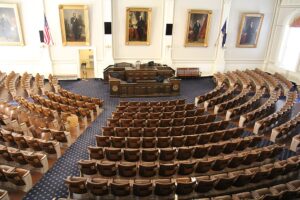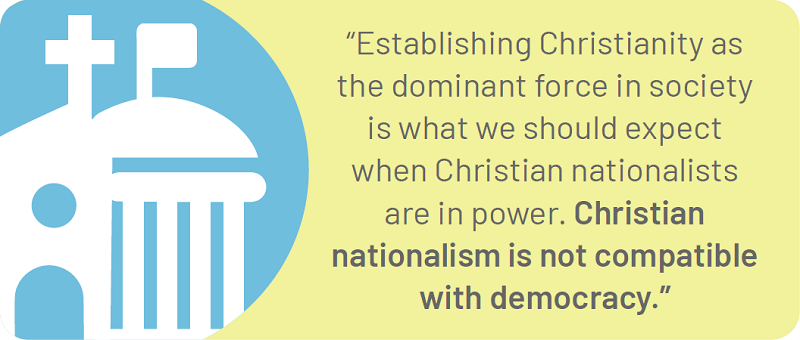Fighting for Inclusion: Secular Lawmakers Battle Hostility at Work as Activists Fight for a Seat at the Table
 The House Chamber of the New Hampshire State House in Concord, NH Photo by Royalbroil via Wikimedia Commons
The House Chamber of the New Hampshire State House in Concord, NH Photo by Royalbroil via Wikimedia Commons When New Hampshire State Representative Sherry Dutzy was elected to her first term in 2018, she was surprised to find that every day of the legislative session opened with Christian sermons. She wasn’t the only legislator to find this to be an inappropriate establishment of religion in the people’s house.
“You don’t go to church expecting a political speech. I don’t come to the legislature to hear a sermon,” Dutzy stated. But when she asked the Speaker of the House if a humanist invocation could be delivered, she was at first stonewalled by bureaucracy, and then explicitly prevented from doing so even when every newly invented requirement was met.
Funny enough, shortly after requesting a humanist invocation, a guest Rabbi was brought in to deliver a prayer to session. Tokenizing Jewish people to maintain the appearance of inclusivity is nothing new—look no further than the often-repeated Christian nationalist talking point that our nation is based on “Judeo-Christian” values.
Soon followed the ending of the “guest chaplain” program and the reinstatement of a house chaplain, who was booked to deliver prayer for the remainder of the session—previously, the Speaker was typically scrambling to find the next guest Christian chaplain a few days prior.
But Dutzy was determined to hold the Speaker and the Assembly accountable to being a space inclusive of all of the legislators New Hampshire voters elected to represent them. She reached out to legislators who share her commitment to protecting religious freedom, the separation of church and state, and the rights of religious minorities. They established a Secular Values Legislative Caucus in 2021.

Their first action as a caucus was to propose a rule, then a floor amendment, including support from six Republicans, which would designate time for an “invocation” instead of a “prayer” before each session. This would open it up to nonreligious participation, but the proposal was narrowly defeated.
New Hampshire has the largest state house with 400 members, and the state has among the highest percentages of religiously unaffiliated people in the nation at 34%. And yet secular lawmakers are being explicitly kept from having an equal opportunity to represent their views.
Even when secular lawmakers are given the opportunity to deliver invocations, they are sometimes met with hostility. Arizona State Representative Athena Salman’s secular invocations have been repeatedly derided and mocked.
Unfortunately, this is not an uncommon experience among legislators. Irene Grimes, a Cumberland County Elections Board member in North Carolina, has been publicly attacked by her colleagues for being an atheist and for proposing the end of sectarian prayer at elections board meetings. “I don’t have anything against anyone’s faith,” she says, “I just don’t think it belongs at an elections board meeting.”
The practice is illegal, and the Board has been advised by a county attorney to discontinue the unconstitutional practice. And yet they continue, because establishing Christianity as the dominant force in society is what we should expect when Christian nationalists are in power. And Christian nationalism is not compatible with democracy.
In the same state, Senator Julie Mayfield had a peculiar experience being sworn in. When she requested to be sworn in on a Constitution (imagine that)—instead of the Bible inscribed with her name that the state gifted to her—the clerk was frazzled and unprepared.
This is the point in the story where folks in blue states often roll their eyes, shake their heads and dismiss this as a red state problem, just what we should expect from highly religious Christian areas of the United States. But Christian nationalism and Christian supremacy permeate our entire culture. Diverse, metropolitan cities like Los Angeles and New York City are far from immune.
In Los Angeles, the executive director of Atheists United, Evan Clark, discovered that the Los Angeles County Board of Supervisors was hosting “faith leader listening sessions” for faith-based organizations to discuss ways the government could partner on social services. All but two were hosted in Churches and opened with a Christian prayer (many often ended with a prayer too).
Not only did Clark find that the initiative made no outreach efforts to include the secular community, it made little effort to recruit any minority religious identities. “The meetings were overwhelmingly attended by Christians and had very little secular and minority religious representation,” said Clark. “The rooms were often over ninety percent Christian-identifying, nothing like the diversity of LA.” At one meeting a county supervisor emphasized frustration with the wall keeping government money from supporting church initiatives that aligned with city initiatives.
Too often “faith-based initiatives” privilege and center Christian organizations. Even when “faith-based” is interpreted more inclusively and brings in other religious minorities, the secular community is rarely included. In Los Angeles County, an area representing over ten million people, there are countless community organizations and leaders being left out of high-level policy discussions simply because they’re not “faith-based.” Clark and his community are advocating for a simple fix: change the program from “faith-based” to “community-based” and include groups like Atheists United, secular non-profits and community leaders, and faith-based organizations.
On the other side of the coast at an interfaith breakfast in February, New York City Mayor Eric Adams outright rejected the separation of church and state and blamed “lack of faith” (read: nonreligious people) for systemic challenges in New York, including homelessness and domestic violence. Despite criticism from religious and secular leaders, he has only dug in further, saying he wants NYC to be a “place of God.”
Public acceptance of nonreligious people has been steadily improving over the years—as of 2020, 60 percent of Americans say they would vote for an atheist for president, compared to 45 percent in 2007. And according to research conducted by the Center for Freethought Equality, it no longer seems to be as much of a political liability as people perceive it to be. But the fact remains that Christian nationalists wield a lot of power in our politics, and too many politicians in both parties are complicit in upholding Christian supremacy. Ceremonial demonstrations of Christian power, like invocations and swearings-in, are only the tip of the iceberg.
Still, courageous lawmakers like Rep. Sherry Dutzy, Rep. Athena Salman, and Elections Board Member Irene Grimes are fighting back. We can do our part as voters and constituents by showing them we have their backs. Get involved by becoming a member (it’s free!) of the Center for Freethought Equality. Get to know the secular elected officials who live in your state and let them know how much you appreciate their work. Let them know they’re not alone, and that our community is there to support them.
When elections come around, back the candidates who share your values, or consider running for office. And if you’re part of a local secular community, hold your elected officials accountable and keep fighting for your seat at the table. Nonreligious Americans have the potential to be a formidable, game-changing political constituency. Making that a reality starts with you.
